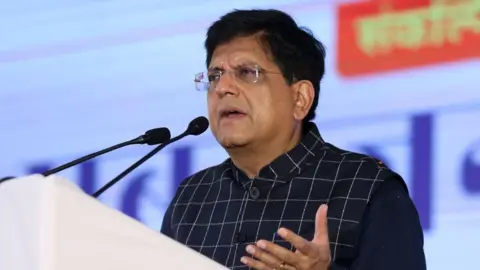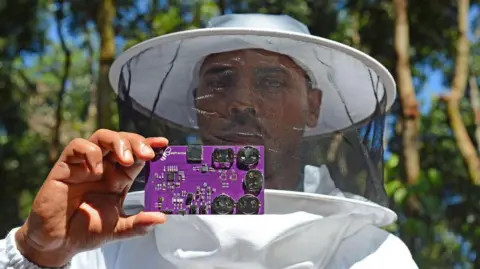AI chips not ice creams - minister's dig at Indian start-ups sparks debate
 Getty Images
Getty ImagesIndia's Commerce Minister Piyush Goyal's recent comments about the country's start-up ecosystem have sparked a massive debate on social media and evoked strong reactions from some entrepreneurs.
At the second edition of Startup Mahakumbh, a government-led start-up conclave last week, Goyal seemed to take a hard look at India's consumer start-ups as he urged entrepreneurs to explore more innovations in technology in order to help the country progress.
Poking fun at the rise of food delivery apps, artisanal brands and online betting apps in the country, he compared them with the innovations being made by the "other side", which many took to mean China.
He said that while "they" were making leaps in machine learning, robotics and building "next-gen factories that can compete with the rest of the world", India's start-ups were still largely focussed on lifestyle products like gluten-free ice creams.
His comments sparked a flurry of reactions from India's top innovators, with some arguing that he was only encouraging creators to be more ambitious and others calling it an unfair criticism of the start-up ecosystem, a major contributor to the country's economy.
 Getty Images
Getty ImagesTo be sure, Goyal also praised the pace at which new businesses were popping up in the country, hailing India as the third-largest start-up ecosystem in the world. He also urged Indian investors to do more to support Indian creators.
But he seemed to want to see more happen, and faster.
"We have to be willing to evolve and learn. [If] we want to be bigger and better, then we have to be bolder and we should not fight shy of the competition," the minister said.
At one point, he asked the audience - brimming with entrepreneurs and investors - "Do we want to make ice creams or [semiconductor] chips?"
Aadit Palicha, co-founder of the quick-commerce app Zepto, was quick to call out the minister.
In a post on X, he argued that it was consumer internet companies like his that have led innovation in the technology space, in India and globally.
- Can tech stop India wasting so much of its harvest?
- The private firms helping India aim high in space
He pointed out that Amazon - originally a consumer internet company - had scaled cloud computing while the big players in AI today, like Facebook and Google, were once consumer internet companies too.
He urged Indian investors to support consumer internet companies so that they can grow and use their profits for making more ambitious innovations.
Mohandas Pai, a prominent angel investor, told news channel Economic Times Now that there was a dearth of capital investment in deep-tech start-ups from the government and private players.
He explained that investors made a beeline for lifestyle-focused start-ups because they gave quick returns.
Deep-tech innovations take a long time to develop and require expensive infrastructure. "People are not willing to take long-term risks. We need long-term 'patient' money [for deep tech start-ups to thrive]," he said.
He also said that regulatory curbs on foreign investments in Indian start-ups were hurting innovation.
"Deep tech start-ups also struggle to find a market," he added, citing the example of an Indian firm that recently pioneered a quick-charging battery for buses but found no takers for its product.
 Getty Images
Getty ImagesMany social media users also spoke about the challenges they faced when they tried to start their own tech businesses.
Some said they struggled to get loans, others highlighted high import taxes on certain foreign raw materials and equipment, while some others spoke about unnecessary red tape that made getting documents and approvals a nightmare.
But some entrepreneurs also defended the minister, saying that his comments were well-intentioned and a much-needed reality-check for the start-up ecosystem.
Vironika S, founder of edtech app Proxy Gyan, agreed that India's future leadership of the global economy depended on breakthroughs in AI and semiconductors but added that there were realistic barriers to doing so and that the government could help by easing them.
Indian investor Kushal Bhagia said in a post on X that Goyal was right about ambition and a lack of deep tech start-ups in India. "We just don't meet enough founders who are doing something truly deep tech or going after big ambitious problem statements," he said.
He attributed this to India's tech talent leaving the country to work in US firms and to a dearth of deep-tech founders for people to learn from and be inspired by.
 Getty Images
Getty ImagesThe minister's comments also got the media analysing different journeys of Indian and Chinese start-ups.
Journalist Abhijeet Kumar wrote in the Business Standard newspaper that in 2023, just 5% of Indian start-up funding went into deep-tech sectors, compared to 35% in China. He also pointed out how Beijing actively promoted high-tech innovation - in 2024, it had slashed $361bn in taxes and fees for high-tech firms, including $80.7bn in research and development deductions.
In an editorial published on Monday, the newspaper also noted that India's start-ups are more consumption-driven, focused on using technology to solve local problems at scale rather than global ones by creating path-breaking foundational models.
It pointed out that India currently had 4,000 deep-tech start-ups and that this number was expected to jump to 10,000 by 2030 and quoted a Nasscom report which said that India's deep tech-start-ups attracted $1.6bn in funding in 2024, marking a 78% year-on-year increase.
But there's still a long way to go.
"As the deep-tech race intensifies globally, it is clear that India will have to do a lot to catch up with these countries," the editorial said, adding that Goyal's comments should "serve as a call to action" for start-ups and investors and also for the government.
"This can include setting up deep-tech innovation funds, building strong academia-start-up bridges and offering incentives for faster developments in hardware, AI, biotech and clean energy," it said.
Follow BBC News India on Instagram, YouTube, Twitter and Facebook.
